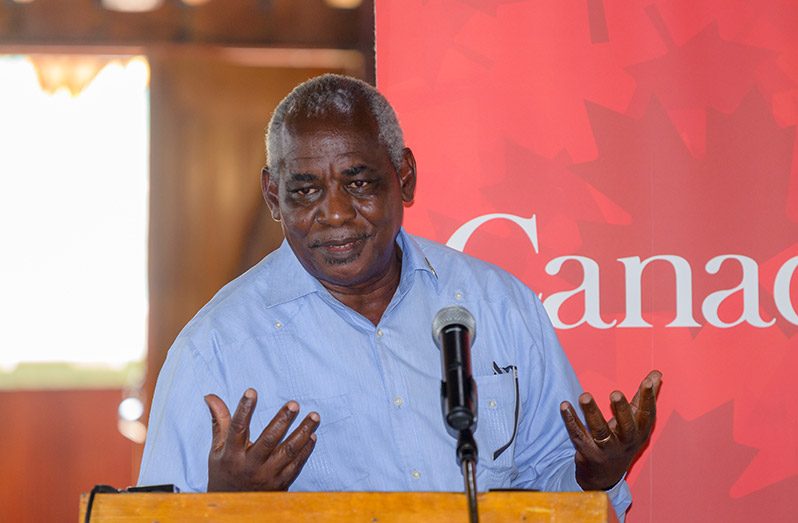-12, 000 women, girls to be targeted
THE Justice Education Society (JES) of British Columbia, Canada, on Tuesday, launched a four-year project which aims to empower approximately 12,000 women and girls, especially those living in Amerindian communities in Guyana.
Country Representative and Project Director, Lisa Thompson, during the launch of “Strengthening Justice for Women, Girls, and Indigenous Peoples in Guyana” which was held at the Umana Yana, said that the project will be executed through a “consultative approach.”
The project is a multimillion-dollar initiative funded by the Canadian Government.
According to Thompson, the project, which runs from 2022-2026, will empower women and girls through technical assistance and capacity-building by working closely with the Guyana Police Force, the Chambers of the Director of Public Prosecutions (DPP), the Judiciary, the National Toshaos Council, women’s groups and civil society organisations (CSOs)
“This project focuses not only on the psychosocial aspects of working with women and girls but also on looking at technically building the skills of the Guyana Police Force in particular from the ground up,” Thompson said.

According to Thompson, the involvement of stakeholders in the planning and execution of the project is important since it’s a “survivor approach” and is centred on gender-based violence and sexual abuse.
She added that the police and civil society will help with the identification of vulnerable communities which are affected by sexual and gender-based violence (SGBV) and are in need of the project’s support.
She explained that while survivors of sexual and gender-based violence are not necessarily only feminine, it is the women and girls who are affected by such social ailments.
In a desk review and diagnostic study conducted by JES in 2018 on access to justice for Indigenous women and Indigenous Peoples, nearly 50 per cent of participants stated that their knowledge of their rights or the law was “low” or “very low”, and less than 30 per cent stated that police services and protection in their communities could be characterised as “fair” or better.
However, Thompson is of the view that with the possible reach of the project, these figures can change.
“The reach of the project, I know it’s very ambitious. We’re hoping to work with 10,000 to 12,000 Guyanese girls and women focusing on the remote areas and working with indigenous populations,” she said.
The outcome of the project seeks the realisation of rights to inclusive, quality, and gender-responsive justice for women, girls and indigenous victims of sexual and gender-based violence locally.

She added that the indirect beneficiaries will include men and boys, as well as large numbers of Venezuelan migrants who are hosted in these communities. They will benefit from an equitable and safe society, and the police’s increased capacity to protect vulnerable victims.
The project is building on other ongoing discussions with the Ministry of Human Services and Social Security, which recently facilitated the training of police officers in addressing gender-based violence.
JES will also be working with the Ministry of Amerindian Affairs with the aim of designing and implementing a programme that looks at cultural sensitivity.
Thompson added that the judiciary had also indicated their interest in having similar work done.
“So that is one of the other pieces of work that we think is going to be very impactful and helpful in terms of affecting power and improving access to justice for women and girls. I think we all know that there are biases that exist. We all carry them with us to some degree or another and it can only help us if we’re able to examine those biases and be aware of how they can affect how we provide services to those who are most in need, and then work to mitigate any negative effects that can have,” she said.
She explained that the beneficiaries are at the centre of the project since it takes a “consultative approach” and works closely with them to determine not just their needs but their involvement from the point of view that they can determine what is best for them.
According to Thompson, people need to know what their rights are and what services exist before they can reach out to access those services.
Meanwhile, Minister of Home Affairs, Robeson Benn, said that the project will deliver gender-transformative and rights-based public legal education, and co-ordinate with strengthened remote police detachments, to respond to gender-based violence and sexual abuse against women and girls.
“…it is an ongoing struggle and a work in progress to bring us to a point where we can all feel safe in the society…,” the Minister said.
Minister Benn said that he is hopeful that the project will be a “template” which will be rolled out across Guyana where lack of access to justice is a principal concern, especially for women and girls.
JES is a Canadian organisation with over 30 years of experience. It has implemented criminal justice reform projects and provided technical support and expertise in 17 countries, including Guyana, since 2015.
The organisation aims to advance the rule of law by empowering people to access and deliver justice, promoting public legal education and information and strengthening justice institutions in Canada and globally.




.png)









